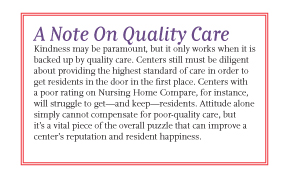Kindness Tops Residents’ Wish Lists
There are steps staff members can take to not only be perceived as friendlier, but to actually feel friendlier.
Peter Feeney
11/1/2016

What does “quality of care” encompass? For those working in skilled nursing care centers and assisted living communities, the answer may include following government standards, careful documentation, reviewing protocol, and solid business practices.
But what about kindness and positive communication with residents? Is that an important part of daily care?
According to medical research, it should be. In fact, it may need to be at the top of the list.
A study in the Journal of the American Medical Association titled, “Obstetricians’ Prior Malpractice Experience and Patients’ Satisfaction With Care,” suggests that the quality of interpersonal care strongly affects the number of lawsuits against a physician. The study found that obstetricians who were sued more frequently lacked good bedside manner and compassion toward patients. Specifically, patient complaints about lack of explanation, being ignored, and feeling rushed were much more frequent among the physicians who had the greatest number of lawsuits in their past.
If the “rude” physicians had a more extensive lawsuit history, then one can conclude that the more caring physicians were able to avoid lawsuits more often. In any kind of personal or professional interaction, people are more apt to forgive a person who is kind. It’s a basic part of human nature. A “cold fish” doctor who doesn’t seem sorry that he made a mistake is going to get sued much more quickly than the apologetic, empathetic one who treats patients more like friends.
Positive Interactions, Powerful Impact
This same logic can apply to long term and post-acute care centers. Each and every employee in the center can make an effort to be more kind, caring, and attentive to residents, and that may make more of a difference than skill and experience. A culture of kindness and compassion may very well be a key part of avoiding lawsuits.
Residents remember the nurse who truly listened to them, the nurse assistant who stopped to help without being asked, and the housekeeper who smiled and offered a warm greeting as he went about his daily tasks. When residents and their family members feel connected with staff and a genuine sense of caring, they may be much slower to pull the litigation trigger when something goes wrong.
Teaching Kindness To The Team
Unfortunately, even kind people may come off as uncaring under certain circumstances. People who are naturally shy, introverted, or who have an especially “matter-of-fact” way of talking may be perceived as cold or taciturn to residents. This doesn’t mean they need to change their personality, but they may benefit from learning how to make a positive impression and to relate to residents on their level. And even the kindest employees may need some reminders about how to display a positive, caring attitude toward all residents each day.
How do the staff learn to do this? According to Rabbi Manis Friedman, author and lecturer, being nice involves simply acting nice. This doesn’t mean being fake, but it means always putting their best foot forward in order to be perceived as more hospitable and friendly. This involves:
- Smiling;
- Offering assistance without being asked;
- Thinking ahead to what else the resident might need;
- Looking residents in the eye while communicating;
- Offering guests more than a “yes” or “no” answer;
- Going above and beyond what they’ve asked;
- Acting as if helping others is a pleasure, not an
- inconvenience;
- Answering questions quickly and courteously; and
- Including residents in decisions that impact them.
The Press Ganey Consulting Group identified perception as a key factor in the pursuit of kindness. Staff members must focus on how to change their perception first by seeing the resident as a human being and focusing on their humanity and fragility. Once this is achieved, it is much easier to truly adhere to the golden rule of “treating others as you want to be treated.”
These may seem like simple, common sense guidelines, but they can be very easy to forget amongst the other daily responsibilities and obligations that weigh on each member of the staff. Not to mention, each team member has a personal life that often sets the tone for how they handle things at work. If their situation at home is suffering, it can be difficult for employees to “turn it off” when they come to work and focus on the job at hand. Consistent reminders to staff and making kindness the center’s culture is the best way to keep it in the forefront despite other distractions.
Measuring Customer Satisfaction
A center’s success with kindness and compassion should be measured regularly by asking the people who are affected by it the most: the residents. A resident satisfaction survey can provide valuable information about how residents feel they are being treated—and center leadership may get an opportunity to nip problems in the bud before they become major issues such as lawsuits and negative publicity.

The first step is to take these surveys seriously, and convey their importance to staff. Consider Press Ganey’s priority index surveys that ask residents specific questions about what matters most to them at their nursing home center. Here are the priorities as reported by residents:
- Priority 1: “Response to concerns/complaints made during your stay.” Patients and families want to know that the staff care about them.
- Priority 2: “Degree to which staff addressed your emotional needs.” Emotional needs are directly related to interactions with staff and if the staff members come across as caring.
- Priority 3: “Staff efforts to include you in decisions about your treatment.” This makes a resident feel valued.
- Priority 4: “Promptness in responding to the call button.” Fast isn’t always best, as this falls below the top three priorities about emotions and kindness.
- Priority 5: “How well the nurses kept you informed.” Although important, the respondents to the survey ranked it below simply being nice.
The results of these surveys reinforce the idea that hospitality models have better outcomes and are preferred by residents and families than those that focus only on fast or “by the book” care methods.
When residents believe staff members truly care about them, they may be more cooperative, understanding, and less likely to complain and consider litigation, even when accidents happen.
Loyalty Is Key
Ultimately, centers gain value by being kind to residents. When satisfaction is high, loyalty follows. Residents’ loyalty will pay off for a community that treats them right, because they will stay, and will be ambassadors of the center through word of mouth.
Bedside manner isn’t just for physicians. Long term and post-acute care centers can benefit greatly from this practice, and should consider it imperative—not optional—in their pursuit to be an exceptional care provider.
Peter Feeney is a managing partner of Chelsea Rhone, HealthCap, a general and professional liability insurance company dedicated to the long term care industry and chief executive officer of QA Reader. He can be reached at peter.feeney@chelsearhone.com or (734) 417-6300.